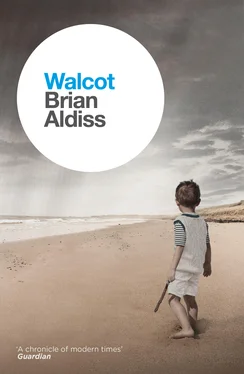BRIAN ALDISS

Harper Voyager
An imprint of HarperCollins Publishers Ltd
1 London Bridge Street
London SE1 9GF
www.harpervoyagerbooks.co.uk
This ebook first published in Great Britain by Harper Voyager in 2015
Copyright © Brian Aldiss 2009
First published in Great Britain by Goldmark 2009
Cover layout design © HarperCollins Publishers Ltd 2015
Cover photographs © Shutterstock.com
Brian Aldiss asserts the moral right to
be identified as the author of this work.
A catalogue copy of this book is available from the British Library.
This novel is entirely a work of fiction. The names, characters and incidents portrayed in it are the work of the author’s imagination. Any resemblance to actual persons, living or dead, events or localities is entirely coincidental.
All rights reserved under International and Pan-American Copyright Conventions. By payment of the required fees, you have been granted the non-exclusive, non-transferable right to access and read the text of this e-book on screen. No part of this text may be reproduced, transmitted, down-loaded, decompiled, reverse engineered, or stored in or introduced into any information storage and retrieval system, in any form or by any means, whether electronic or mechanical, now known or hereinafter invented, without the express written permission of HarperCollins.
Source ISBN: 978-0-00-748226-9
Ebook Edition © December 2015 ISBN: 978-0-00-748227-6
Version: 2015-10-19
To Ronnie
with remembrance of Ruth
with regards as always
God forbid that we should give out a dream of our own imagination for a pattern of the world.
– Francis Bacon
Novum Organum
Contents
Cover
Title Page
Copyright
Dedication
Epigraph
Introduction
PART ONE
Chapter 1: Barefoot
Chapter 2: An Adult Breath
Chapter 3: Almost Drowned
Chapter 4: An Absolute Slave
Chapter 5: ‘Bloody Cripples!’
Chapter 6: Earth Sciences
Chapter 7: The New Widow
Chapter 8: Kendal, of All Places
Chapter 9: A Good Old Row
Chapter 10: A Slight Change of Plan
Chapter 11: Carnage on the Road
Chapter 12: ‘War or no War …’
Chapter 13: ‘We’re Okay Here …’
Chapter 14: Over the Boundary
Chapter 15: Le Forgel
Chapter 16: A Lesson in Aristotle
Chapter 17: The Wehrmacht Pays a Visit
PART TWO
Chapter 1: What a Wild Man
Chapter 2: Hoarded Biscuits
Chapter 3: Christmas at Gracefield
Chapter 4: ‘Please Not to Shoot Us’
Chapter 5: Endless Carnage
Chapter 6: Kiss Whom You Like
Chapter 7: Leaving Home
Chapter 8: Old Children
Chapter 9: Ex-Army Furniture
Chapter 10: A Man About Town
Chapter 11: A Break in Torremolinos
Chapter 12: The Disastrous Party
Chapter 13: On the Grand Canal
Chapter 14: Elizabeth Sips Her Wine
Chapter 15: ‘I Must Love Abby’
Chapter 16: A Modernizing Government
Chapter 17: In the Alley
Chapter 18: Blood on the Ice
PART THREE
Chapter 1: A New Line of Thought
Chapter 2: Guernica
Chapter 3: One of the Poor
Chapter 4: ‘We Don’t Want no Trouble’
Chapter 5: Some Family Conversation
Chapter 6: Over Jurassic Sand
Chapter 7: Another Invitation
Chapter 8: Supper at Sandy Bassett
Chapter 9: Tolstoy Unread
Chapter 10: Violet in Her Bath
Chapter 11: Flight to Austin, Texas
Chapter 12: The Future of the World
Chapter 13: An Arrival From Venice
Chapter 14: The Known Unknowns
Chapter 15: The Sacrifice
Chapter 16: A Fuller Understanding
Notes
About the Author
Also by Brian Aldiss
About the Publisher
‘You are free men, whatever that means.’ So says Steve Fielding to some German soldiers, whose lives he spares during the closing events of a world war, in the freezing cold Ardennes. But Steve, as we learn in this complex unfolding of a life, is himself not a free man.
We find him first of all as a child, playing alone on a Norfolk beach – the beach that gives this complex tale its title.
Already, like a tide, doubt enters his life. Is he in danger? High on the dunes, a woman, almost a stranger, looks to see if Steve is safe.
So the question arises, to be solved if possible: do Steve’s parents wish to get rid of him? In love, in war or peace – or in an uncertain interlude between the two – the uncertainty continues to tease.
As this delightful and complex story unfolds, the reader meets new astonishments and some strange old events.
Questions remain, but now there’s beloved Verity – and a cheetah – and of course the sort of unexpected we all expect to meet.
A long and intriguing story unfolds before us.
Brian W. Aldiss
Oxford, 2015
PART ONE
At high tide, the sea lapped close to the dunes, leaving little sand to be seen. The remaining sand above the high tide mark was as fine as sifted salt. Spikes of marram grass grew from it like quills from a porcupine. No stones were visible. The small waves, white and grey, seethed against their limits. How lonely it was, this wild coastline.
When the tides began their retreat, they revealed first a line of pebbles, grey and black. The pebbles gleamed like jewels until the sun dried them, when they became as grey and inert as if they had grown rapidly old and died. Occasionally among the stones lay a small, dead crab, its up-turned belly the respectable white of death.
The pulse of the sea appeared to quicken; its faltering waves had left the slopes of the beach and were now retreating over level territory. Venturing down to follow this august daily event, you found your feet sinking into the wet sand, and so you kept moving. The sand squelched with every step you took, turned pale, went dark. Went slurp .
Stretches newly revealed were bare, immaculate, except perhaps for that baby crab, soft to the touch as you bent down to it. What caused it to die? Did crabs become ill?
Everything about you shone with a joyous newness.
The small ripples of waves as they rolled back towards their mother sea were transparent, and consequently looked as golden as the sand beneath them. They were so beautiful it was essential to pat them with bare feet, to jump up and down in them, splashing.
So you followed this grand revanche , as if you, too, were determined to get back into the real sea. You were hopping about in a world of ceaseless movement; these waves, or very similar waves, would never stop, would still be rolling back and forth in their interplay with the beach for eternity, or until you grew up, whichever time was the nearer. You felt very close to eternity because everything here was marvellous, and in this year before the nineteen-thirties had dawned, you had the entire beach all to yourself.
Look to left, look to right. Along the great expanses of beach, not a single person was to be seen.
All through that slumbrous summer you were there, playing on the sands. And in those bygone summers the sun shone always overhead, undeterred by cloud. The sun was there when you arrived on the dunes in the morning, pausing and taking in the whole wonderful spectacle, and when you departed in the late afternoon; at that time, the red ball of it was only just beginning to slope down towards those dunes.
Читать дальше











